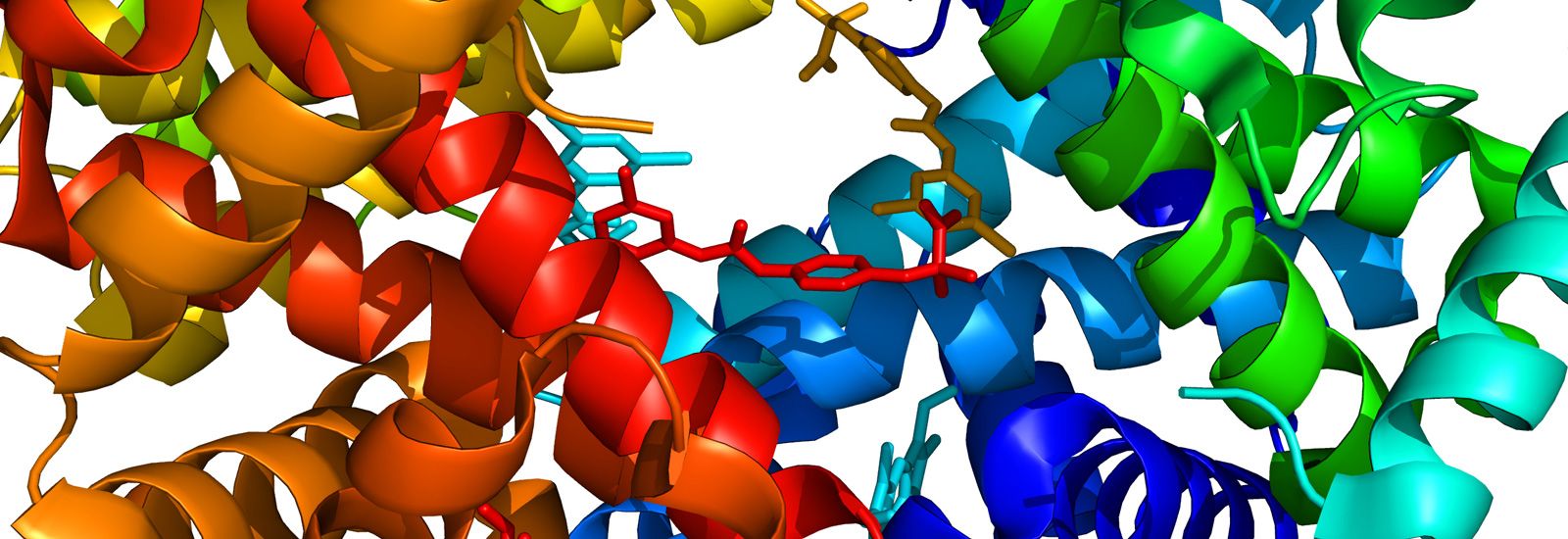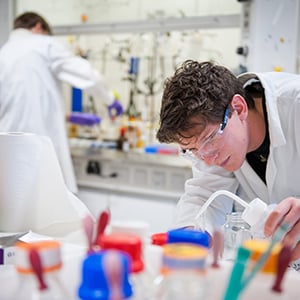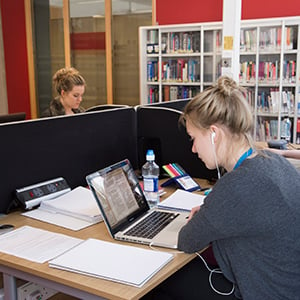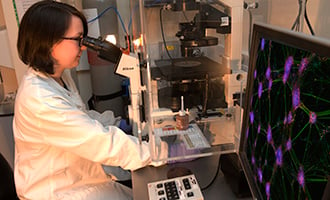
Biomedical Sciences
Course overview
UCAS code: BC98
Entrance requirements: A*AA excluding Critical Thinking and Thinking Skills
Course duration: 4 years (MBiomedSci); 3 years (BA)
Subject requirements
Required subjects: Two from Biology, Chemistry, Maths and Physics
Recommended subjects: Not applicable
Helpful subjects: Not applicable
Other course requirements
Admissions tests: ESAT
Written Work: None
Admissions statistics*
Interviewed: 24%
Successful: 8%
Intake: 45
*3-year average 2023-25
Contact
Email: [email protected]
Unistats information for this course can be found at the bottom of the page
Please note that there may be no data available if the number of course participants is very small.
About the course
Biomedical science focuses on how cells, organs and systems function in the human body; an exciting and dynamic area that is highly relevant to the understanding and treatment of human diseases.
Oxford is a world leader in biomedical research and teaching. Students on this course will benefit from tuition from scientists working across a wide range of nonclinical and clinical departments.
This course provides students with an intellectually stimulating education in modern molecular, cellular and systems biology, and neuroscience. Please note this course does not provide medical training.
The Biomedical Sciences course at Oxford has been designed so that in year 1 students acquire an integrated understanding of biomedical science. This foundation allows them to shape their subsequent studies towards the topics that interest them the most.
Practical laboratory work forms an integral part of this programme. You will be required to complete these practical elements to a satisfactory standard in order to progress through the course.
As the course progresses, increasing emphasis is placed on scientific research, as students obtain first-hand experience conducting original laboratory research in years 2-3. Students choose their own research projects and supervisors. The possible areas for investigation within the University are wide ranging.
Students can elect to graduate after three years with a BA degree. Based on the student's selection of second-year modules and third-year options, they will be awarded a degree in either Neuroscience or Cell and Systems Biology.
The research-intensive fourth year leads to the award of a Master’s degree. Students who complete the fourth year will graduate with a Master’s degree in either Neuroscience or Cell and Systems Biology, determined by their choice of modules and options in preceding years.
 |  |  |
'My course is already pretty specific in orientating the learning towards human biology, for those not wanting to be a medic. However, on top of that it allows you to specify options after first year. So, from second year onwards I am doing more specifically what I want to do. I can focus on the areas of human science that really interest me and cut out those that turn me off. This makes work much more enjoyable when you actively want to learn more about the subject, beyond the recommended reading list.' Tamsin | 'The first year is so incredibly broad! I went into first year with no doubt in my mind that I'd be specialising in genetics or immunology, but a few psychology and neuroscience lectures later my whole plan had changed! If I didn't do Biomedical Sciences, I may have never even considered neuroscience as something to dedicate my career towards!' Jack | 'Although in school I was encouraged to apply for Medicine, my interests were much more about the science than patient interaction. The brilliance of the Biomedical Sciences course at Oxford is the luxury of choice. It has been designed in a ‘stepping stone’ fashion, providing students with a solid foundation of science in the first year and then allowing them to tailor the course to their particular interests over the following two years. You can tell they’ve really thought about the structure and it’s arguably one of the best and most exciting courses Oxford offers.' Mark |
Unistats information
Discover Uni course data provides applicants with Unistats statistics about undergraduate life at Oxford for a particular undergraduate course.
Please select 'see course data' to view the full Unistats data for Biomedical Sciences.
Please note that there may be no data available if the number of course participants is very small.
Visit the Studying at Oxford section of this page for a more general insight into what studying here is likely to be like.
Biomedical Sciences
A typical week
In your first year you would typically attend six to ten lectures, a Mathematics or Statistics class and a three-hour practical class each week.
In addition, you will typically prepare for and attend two weekly tutorials during which you will discuss the significance and limitations of a given topic with your tutors, through consideration of experimental studies. Your remaining time will be available for independent study.
During the first two terms of the second year, your work is divided between around five lectures and one to two tutorials each week, in addition to practical classes. The final term concentrates on experimental research in a laboratory.
During the third year you will attend lectures, seminars and tutorials in your chosen specialist area.
During the fourth year, you will be working almost exclusively on your extended research project and attending original research seminars to bolster your understanding of experimental biomedical sciences.
Tutorials usually include 2-4 students and a tutor. Class sizes vary according to the type of class: workshops are typically 10 students, while practical classes are normally up to 40 students.
Most tutorials, classes, and lectures are delivered by members of academic staff or research staff. Many are world-leading experts with years of experience in teaching and research. Some tutorial and class teaching may also be delivered by postgraduate students who are usually studying at doctorate level.
To find out more about how our teaching year is structured, visit our Academic Year page and the Biomedical Sciences website.
Course structure
Terms 1-3 (Year 1)
Courses | Assessment |
|---|---|
| In person examinations and other types of assessment at the end of year 1. A satisfactory practical record is required for progression to Year 2. |
Terms 4-5 (Part A finals)
Courses | Assessment |
|---|---|
Students select courses totalling ten units from a wide range of subject areas, which currently include:
The full list is available on the Biomedical Sciences website. | In person examinations at the start of the sixth term. An academic penalty will be applied for an unsatisfactory practical record. |
Terms 6-9 (Part B finals)
Courses | Assessment |
Terms 6-8Students work on their short research project and specialist review. Terms 7-9Students undertake advanced study, including consideration of material selected from a wide range of specialised options that cover:
Students will choose whether they wish to graduate from the course with either a degree in Cell and Systems Biology or a degree in Neuroscience. The degree awarded will depend on the pattern of options chosen. View the full list of current options available. | In person examinations during the third term of the final year. Students will also submit coursework and deliver a presentation on their research findings to the examiners. Performance at 2:1 level in Years 2 and 3 is required for progression to Year 4. |
Terms 10-12 (Part C finals)
Courses | Assessment |
Terms 10-12Students work on their extended research project and a review article on state of the art research in a chosen field. | Students will submit coursework and deliver a presentation on their research findings to the examiners. |
The content and format of this course may change in some circumstances. Read further information about potential course changes.
Academic requirements
Qualification | Requirements |
|---|---|
A-levels: | A*AA excluding Critical Thinking and Thinking Skills. |
Advanced Highers: | AA |
Highers: | AAAAA Candidates are required to have an Advanced Higher in at least one from Biology, Chemistry, Physics or Mathematics, and two Highers from Biology, Chemistry, Physics and Mathematics. |
International Baccalaureate (IB): | 39 (including core points) with 766 at HL. Candidates are required to have two subjects from Biology, Chemistry, Physics and Mathematics at Higher Level. |
BTEC Level 3 Extended Diploma: | Please visit the Biomedical Sciences website for details on academic requirements. |
Any other equivalent qualification: | View information on other UK qualifications, and international qualifications. |
Wherever possible, your grades are considered in the context in which they have been achieved.
Read further information on how we use contextual data.
Subject requirements
Essential: | Candidates are required to have two of their A-levels from Biology, Chemistry, Physics and Mathematics. If a practical component forms part of any science A-levels taken, we expect candidates to have taken it and passed. Note there are no formal GCSE requirements for Biomedical Sciences. However, if not taken on to a higher level (A-level or equivalent), all candidates will need to have received a basic education (achieving at least a grade C/4 at GCSE, Intermediate 2 or Standard grade (Credit) or equivalent) in Biology, Chemistry, Physics (GCSE Dual Award Combined Sciences or equivalent is also acceptable) and Mathematics in order to be adequately equipped for the application process and for the academic demands of the course. Please visit the Biomedical Sciences website for further details on academic requirements. |
|---|
If English is not your first language you may also need to meet our English language requirements.
Applying
All candidates must follow the application procedure as shown on our Applying to Oxford pages.
The following information gives specific details for students applying for this course.
Admissions test
Test | ESAT |
Test date(s) | Test dates will be announced in April 2026. Oxford applicants must book a test for the October sitting. |
All candidates must take the ESAT as part of their application.
All the information you need to arrange to take your test as well as how best to prepare can be found on the UAT-UK website.
Written work
You do not need to submit written work as part of an application for this course.
What are tutors looking for?
Tutors look for lively, receptive minds with the ability to evaluate evidence critically.
You should be able to consider issues from different perspectives and have a capacity for logical and creative thinking. ESAT results will be considered when shortlisting candidates for interview.
Please visit the Biomedical Sciences website for more detail on the selection criteria for this course.
Careers
This course provides a strong foundation to pursue academic research, work in the pharmaceutical and biotechnology sectors, or apply for an accelerated graduate-entry course in medicine. In recent years, around two thirds of our graduates have gone on to study for a higher degree or a clinical qualification.
The Biomedical Sciences course at the University of Oxford is a full-time, basic science degree course, offering education in cell and systems physiology and neuroscience. It is not accredited by the Institute of Biomedical Science.
We don't want anyone who has the academic ability to get a place to study here to be held back by their financial circumstances. To meet that aim, Oxford offers one of the most generous financial support packages available for UK students and this may be supplemented by support from your college.
Fees
Please note that for full-time Home undergraduate students, current university policy is to charge fees at the level of the cap set by the government, which for 2026/27 is £9,790. For details of annual increases, please see our guidance on likely increases to fees and charges. In the 2027/28 academic year course fees for Home fee status students will rise to £10,050 (in line with the government fee cap).
Fee status | Annual Course fees |
| Home | £9,790 |
| Overseas | £54,990 |
Further details about fee status eligibility can be found on the fee status webpage.
For more information please refer to our course fees page. Fees will usually increase annually. For details, please see our guidance on likely increases to fees and charges.
Living costs
Living costs at Oxford might be less than you’d expect, as our world-class resources and college provision can help keep costs down.
Living costs for the academic year starting in 2026 are estimated to be between £1,405 and £2,105 for each month you are in Oxford. Our academic year is made up of three eight-week terms, so you would not usually need to be in Oxford for much more than six months of the year but may wish to budget over a nine-month period to ensure you also have sufficient funds during the holidays to meet essential costs. For further details please visit our living costs webpage.
Financial support
Home | A tuition fee loan is available from the UK government to cover course fees in full for Home (UK, Irish nationals and other eligible students with UK citizens' rights - see below*) students undertaking their first undergraduate degree**, so you don’t need to pay your course fees up front. In 2026 Oxford is offering one of the most generous bursary packages of any UK university to Home students with a family income of around £50,000 or less, with additional opportunities available to UK students from households with incomes of £32,500 or less. The UK government also provides living costs support to Home students from the UK and those with settled status who meet the residence requirements. *For courses starting on or after 1 August 2021, the UK government has confirmed that EU, other EEA, and Swiss Nationals will be eligible for student finance from the UK government if they have UK citizens’ rights (i.e. if they have pre-settled or settled status, or if they are an Irish citizen covered by the Common Travel Area arrangement). The support you can access from the government will depend on your residency status. |
Islands | Islands students are entitled to different support to that of students from the rest of the UK. Please refer the links below for information on the support to you available from your funding agency: |
Overseas | Please refer to the "Other Scholarships" section of our Oxford Bursaries and Scholarships page. |
**If you have studied at undergraduate level before and completed your course, you will be classed as an Equivalent or Lower Qualification student (ELQ) and won’t be eligible to receive government or Oxford funding
Additional Fees and Charges Information for Biomedical Sciences
In the third term of the second year, students who undertake a research project may wish to remain in Oxford after the end of full term to facilitate completion of their project.
However, this extended residence in Oxford is not a requirement and students should be aware that no financial support is available to help with any additional living costs during this time.
Visit the likely range of living costs for an additional month in Oxford.
In the (optional) fourth year of the Biomedical Sciences course, students will need to be in residence for an extended first term to begin their research project.
You will need to be in Oxford for 12 weeks in the first term. This extended term means that you will need to budget for slightly higher living costs in the final year, as you will be required to be in Oxford for longer than the standard term.
The additional work in the fourth year means that you will graduate with an MBiomedSci – a master’s degree – as well as invaluable research experience that will be excellent preparation for further study or a range of careers.
Contextual information
Unistats course data from Discover Uni provides applicants with statistics about a particular undergraduate course at Oxford. For a more holistic insight into what studying here is likely to be like, please view the information below and explore our website more widely.
The Oxford tutorial
College tutorials are central to teaching at Oxford. Typically, they take place in your college and are led by your academic tutor(s) who teach as well as do their own research. Students will also receive teaching in a variety of other ways, depending on the course. This will include lectures and classes, and may include laboratory work and fieldwork. However, tutorials offer a level of personalised attention from academic experts unavailable at most universities.
During tutorials (normally lasting an hour), college subject tutors will give you and one or two tutorial partners feedback on prepared work and cover a topic in depth. The other student(s) in your tutorials will typically be doing the same course as you and covering the same topic. Such regular and rigorous academic discussion develops and facilitates learning in a way that isn’t possible through lectures alone. Tutorials also allow for close progress monitoring so tutors can quickly provide additional support if necessary.
Read more about tutorials and an Oxford education
College life
Our colleges are at the heart of Oxford’s reputation as one of the best universities in the world.
- At Oxford, everyone is a member of a college as well as their subject department(s) and the University. Students therefore have both the benefits of belonging to a large, renowned institution and to a small and friendly academic community. Each college or hall is made up of academic and support staff, and students. Colleges provide a safe, supportive environment leaving you free to focus on your studies, enjoy time with friends and make the most of the huge variety of opportunities.
- Each college has a unique character, but generally their facilities are similar. Each one, large or small, will have the following essential facilities:
- Porters’ lodge (a staffed entrance and reception)
- Dining hall
- Lending library (often open 24/7 in term time)
- Student accommodation
- Tutors’ teaching rooms
- Chapel and/or music rooms
- Laundry
- Green spaces
- Common room (known as the JCR).
- All first-year students are offered college accommodation either on the main site of their college or in a nearby college annexe. This means that your neighbours will also be ‘freshers’ and new to life at Oxford. This accommodation is guaranteed, so you don’t need to worry about finding somewhere to live after accepting a place here, all of this is organised for you before you arrive.
- All colleges offer at least one further year of accommodation and some offer it for the entire duration of your degree. You may choose to take up the option to live in your college for the whole of your time at Oxford, or you might decide to arrange your own accommodation after your first year – perhaps because you want to live with friends from other colleges.
- While college academic tutors primarily support your academic development, you can also ask their advice on other things. Lots of other college staff including welfare officers help students settle in and are available to offer guidance on practical or health matters. Current students also actively support students in earlier years, sometimes as part of a college ‘family’ or as peer supporters trained by the University’s Counselling Service.
Connect with us
Outreach programmes and events
Many academic departments and faculties at Oxford have dedicated outreach events and activities aimed at promoting their subject area(s) and supporting talented students from all backgrounds to apply to their courses.
University-wide events and resources
In addition to exploring department-run activities, we recommend checking out the outreach event calendar for upcoming University-wide events and other subject and college activities.
Subject-specific resources supporting supercurricular engagement for all ages can also be found via the University's Digital Resource Hub, suggested subject resources webpage and Oxplore, our online learning platform for 11-to-18-year-olds.
UK state school students interested in this or similar courses may like to explore UNIQ, Oxford's free flagship outreach programme for students in their first year of further education. UNIQ offers a choice of academic residentials in over 30 courses and each year provides around 1,500 students with the opportunity to experience Oxford's teaching, explore student life and receive expert support with their application to university.
Prospective applicants can sign up to receive step-by-step support with their Oxford application.
Read more about Oxford's widening access initiatives and other ways to connect with us before applying.

